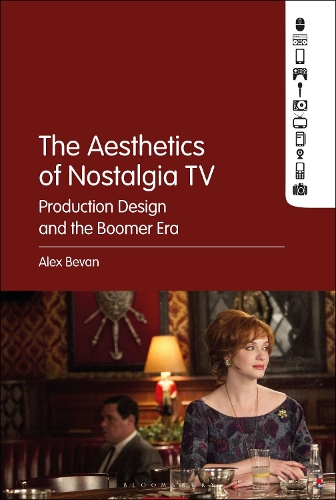
The Aesthetics of Nostalgia TV: Production Design and the Boomer Era
(Paperback)
Available Formats
Publishing Details
The Aesthetics of Nostalgia TV: Production Design and the Boomer Era
By (Author) Alex Bevan
Bloomsbury Publishing PLC
Bloomsbury Academic USA
20th August 2020
United States
Classifications
Tertiary Education
Non Fiction
Television production: technical and background skills
Cognition and cognitive psychology
Film, TV and Radio industries
791.4301
Physical Properties
Paperback
264
Width 152mm, Height 229mm
358g
Description
The Aesthetics of Nostalgia TV explores the aesthetic politics of nostalgia for 1950s and 60s America on contemporary television. Specifically, it looks at how nostalgic TV production design shapes and is shaped by larger historical discourses on gender and technological change, and Americas perceived decline as a global power. Alex Bevan argues that the aesthetics of nostalgic TV tell stories of their own about historical decline and progress, and the place of the baby boomer television suburb in American national memory. She contests theories on nostalgia that see it as stagnating, regressive, or a reversion to outdated gender and racial politics, and the technophobic longing for a bygone era; and, instead, argues nostalgia is an important form of historical memory and vehicle for negotiating periods of historical transition. The book addresses how and why the shows construct the boomer era as a placeholder for gender, racial, technological, and declensionist discourses of the present. The book uses Mad Men (AMC, 2007-2015), Ugly Betty (ABC, 2006-2010), Desperate Housewives (ABC, 2004-2012), and film remakes of 1950s and 60s family sitcoms as primary case studies.
Reviews
When Bevan hits her critical stride the results can be fascinating, and her understanding of nostalgia as a multilayered and often contradictory cultural phenomenon is often exemplary. * Alphaville: Journal of Film and Screen Media *
An important addition to the field offers a compelling assessment of a long-overlooked facet in understanding nostalgia inducing television shows. * Historical Journal of Film, Radio and Television *
Nostalgia, Alex Bevan demonstrates, is a material practice that brings the past into the present and vice versa, in ways that are complex, contradictory, and deeply political. The Aesthetics of Nostalgia TV takes us on a wide-ranging tour of the materiality of contemporary television and how particular practices evoke, remake, and comment upon the past, be it through the recycling of sets in Desperate Housewives, the modernist furniture of Ugly Betty, or the shape and style of ice cubes, flatware, and shirt-dresses in Mad Men. Expertly weaving together fashion, design, and architectural history with interviews of those who supply the below-the-line labor of televisions production, set, and costume design, The Aesthetics of Nostalgia TV expands and reimagines the possibilities of television criticism. * Grant Bollmer, Assistant Professor of Media Studies, North Carolina State University, USA, and Honorary Associate, Department of Media and Communications, University of Sydney, Australia *
With its attention to "below the line" creativity, intergenerational modalities and the unstable nostalgia that governs so many representations of baby boomer culture, this book travels down many productive paths. In so doing, it offers an exceptionally holistic account of US television. * Diane Negra, Professor of Film Studies and Screen Culture, University College Dublin, Ireland *
Aesthetics of Nostalgia TV: Production Design and the Boomer Era is a marvelous accomplishment as a theoretical intervention making a powerful case for production design and art directions pivotal role in contemporary television dramas aesthetic and story-telling practices. It is also a significant extension of production studies to the pivotal creative work of those involved in staging production through props, costuming, and architectural settings. Bevan usefully and artfully shows just how fruitful the exchange has been between architecture and production design with sets becoming less like theatrical spaces and more like real built environments as producers have turned to improvements in production design to provide compelling television. Part genre study of nostalgia TV and part case study of the central role played by production design and designers more generally, Bevan expertly weaves together the central role played not only by props, costumes and built sets but by the businesses and creative workers who work with these to the overall shape, power, cultural resonance, of television series production. * Tom O'Regan, Professor of Media and Cultural Studies, University of Queensland, Australia *
Author Bio
Alex Bevan is a Lecturer in Digital Media at the School of Communication and Arts at the University of Queensland in Brisbane, Australia. Her articles have appeared in Cinema Journal, Adaptation and Television and New Media.
